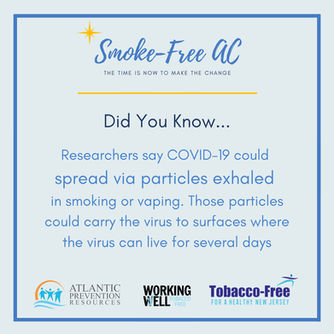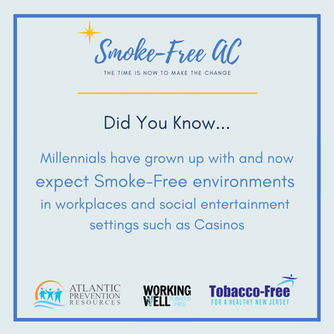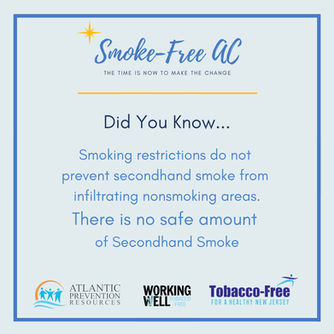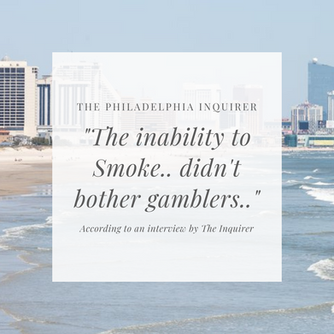
Atlantic City needs to be a
Clean, Safe and Healthy environment
for it's guests and employees
now more than ever


Our Mission
_edited_pn.png)
Our mission is to educate and advocate for Atlantic City Casinos to be 100% Smoke Free to protect the health and safety of over 22,000 casino employees and all guests visiting Atlantic City.
There is no safe level of exposure to secondhand smoke.
Secondhand smoke is a top preventable cause of disease and death, killing 42,000 Americans every year. Secondhand smoke is also a risk factor for susceptibility to more severe COVID-19 symptoms because of the demonstrative impact it has on underlying health conditions including heart disease, diminished lung function, and associated risk of respiratory illnesses.
Now more than ever is a crucial time to address health and wellness. Smoke Free air protects the health and safety of all employees and guests including those who have respiratory, cardiovascular, and all those most susceptible to COVID-19.
Just as social distancing and hand washing help to prevent the spread of disease, eliminating second and thirdhand smoke is critical in preventing the spread of COVID-19.
Casino News
_edited_pn.png)
Smoke Free Casinos, ANRF
70% of Legislature — are now Co-Sponsoring Bills to Eliminate Casino Smoking Loophole
“With overwhelming support for the bill in both the New Jersey Senate and Assembly, it’s clear that the time has come to protect casino workers and end indoor smoking in casinos,” said Cynthia Hallett, president and CEO of Americans for Nonsmokers’ Rights. “New Jersey lawmakers have heard time and again about the detrimental and life-threatening health implications of indoor smoking, and they should act quickly to pass this essential piece of legislation. It’s time." to hold a vote.”
NJ.com
Atlantic City Casino Smoking Ban Proposal gets Another Passionate Hearing, but No Vote is Set
"The proposed law (S264) has been years in the making. It would close a 17-year-old loophole in a 2006 state law that barred smoking in indoor public places in New Jersey....
Michelle Larkin, vice president for program management at the Robert Wood Johnson Foundation, said “denying casino workers protection has no basis” in science, equity, or common sense."

-
Hand to mouth contact (the smoking action) easily increases spread
Learn more about COVID-19 and Tobacco
-
Thirdhand Smoke Researchers warn that COVID-19 could be spread via particles exhaled in smoking or vaping
-
Just as social distancing and hand washing help prevent the spread, eliminating secondhand smoke is critical
-
Smokers are among population at higher risk for developing more serious complications from COVID-19 illness
_edited_pn.png)

_edited_pn.png)
















